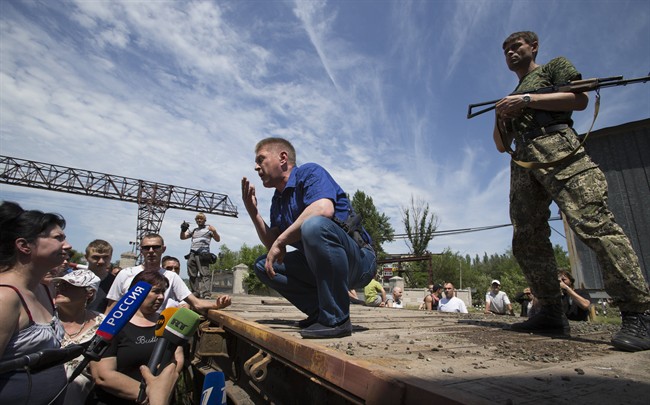SLOVYANSK, Ukraine – Several trains carrying weapons and planeloads of troops have left regions near Ukraine as part of a massive military pullout, the Russian Defence Ministry said Thursday, even as fighting raged between pro-Russian insurgents and government forces in eastern Ukraine.

The ministry said four trainloads of weapons and 15 Il-76 heavy-lift transport planes left the Belgorod, Bryansk and Rostov regions on Wednesday. The ministry added that the troops are to reach their permanent bases before June 1.
NATO, which estimates that Russia has 40,000 troops along the border with Ukraine, repeated Tuesday that it hadn’t yet seen any signs of a Russian withdrawal.
Russian President Vladimir Putin scoffed at NATO’s skepticism, saying Wednesday that the pullout involving large numbers of troops would take time and “those who aren’t seeing it should look better.” He said the pullout will be clearly visible in satellite images.
The announcement went further than an earlier step by the Russian leader two weeks ago, when he said the troops retreated from the border to shooting ranges.
Putin’s pullout order and his remarks welcoming Ukraine’s presidential election this Sunday reflected an attempt to ease tensions with the West over Ukraine and avoid a new round of Western sanctions.
Pro-Russian insurgents in the east, who have seized government buildings and engaged in clashes with government troops that have left scores dead since April, on Thursday continued battling the Ukrainian forces around Slovyansk, the eastern city that has been the epicenter of fighting.
In the village of Semenovka on the outskirts of Slovyansk, artillery shelling that appeared to come from government positions badly damaged several houses Thursday.
Zinaida Patskan, 80, had the roof of her house torn by an explosion, which also shattered one of the walls. “Why they are hitting us?” she said, bursting into tears. “We are peaceful people!”
Patskan, who wasn’t hurt, said she was hiding under a kitchen table with her cat, Timofey, when the shelling came.
The outraged local residents blamed both of the warring sides for the fighting that damaged their houses and endangered their lives.
Many in the east resent the central government in Kyiv, which came to power after the ouster of a pro-Russian president in February following mass of protests, seeing it as a bunch of nationalists bent on repressing Russian speakers. But many local residents have grown increasingly exasperated with the rebels, whom they blamed for putting civilians in the crossfire.
Pro-Russian rebels have declared two regions independent following referendums dismissed as a sham by Ukraine and the West, and some called for joining Russia. Putin has ignored the plea as he sought to ease the worst crisis in Russia’s relations with the West since the Cold War.
The United States and the European Union imposed travel bans and asset freezes on members of Putin’s entourage after Russia annexed Crimea in March. The U.S. and EU have warned that more crippling sanctions against entire sectors of the Russian economy would follow if Russia tries to grab more land or attempts to derail Ukraine’s election.
Moscow has supported a peace plan brokered by Switzerland and the Organization for Security and Cooperation in Europe, which envisages a broad amnesty and the launch of a national dialogue that focuses on the decentralization of government and upholding the status of the Russian language.
Russia also has pushed for guarantees that Ukraine will not join NATO and has advocated constitutional reforms that would give broader powers to the regions, which would maintain Moscow’s clout in the Russian-speaking eastern regions that form the nation’s industrial heartland.
—
Isachenkov reported from Moscow.



Comments